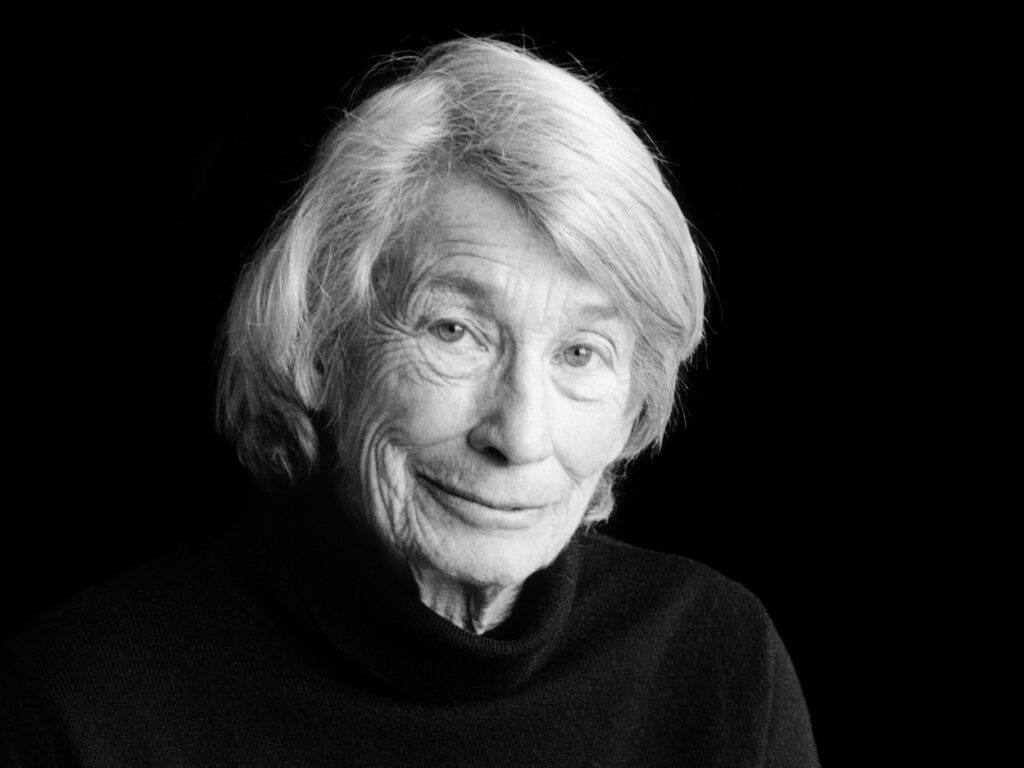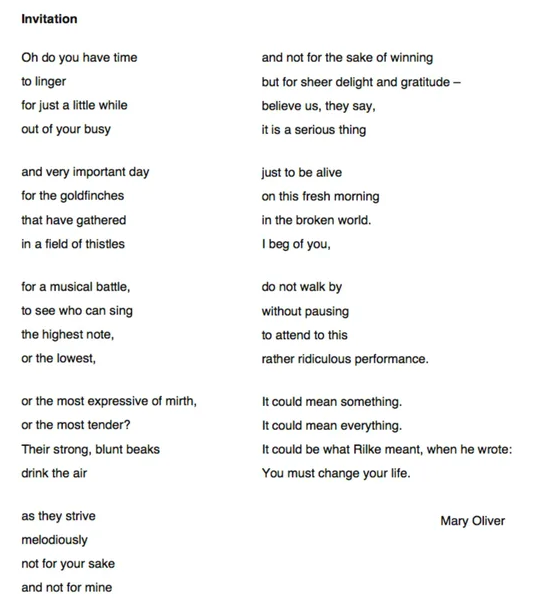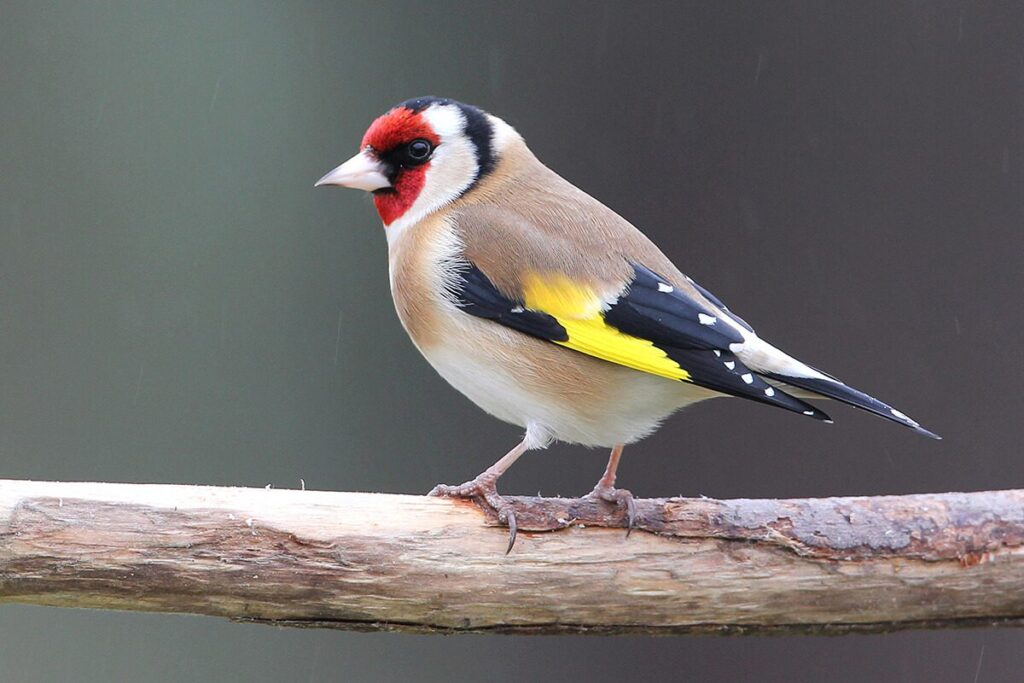Award-winning poet Mary Oliver has published more than fifteen collections of poetry in the last century. She has won the National Book Award and the Pulitzer Prize, establishing herself as one of the bestselling American poets of her time. Her typical reflections of optimism, which often use natural imagery, blend the internal experience with the external. She develops a visualisation of the everyday experience of peace through this interaction between the mind and the world it resides in. Maxine Kumin comments that Oliver ‘stands quite comfortably on the margins of things, on the line between earth and sky, the thin membrane that separates human from what we loosely call animal.’[1] Her poems not only describe the natural world, but they also comment on how we observe it, and our role within it. Successfully creating a sense of inner peace relies on her abilities to explore the human experience in this manner.
The following two poems epitomise Oliver’s style and preoccupations. They are perfect examples for how her poetry can instil a sense of inner peace.

Hello, sun in my face.
Hello, you who make the morning
and spread it over the fields
and into the faces of the tulips
and the nodding morning glories,
and into the windows of, even, the
miserable and crotchety –
best preacher that ever was,
dear star, that just happens
to be where you are in the universe
to keep us from ever-darkness,
to ease us with warm touching,
to hold us in the great hands of light–
good morning, good morning, good morning.
Watch, now, how I start the day in happiness, in kindness.
Mary Oliver’s ‘Why I Wake Early’
This poem is full of comfort. Its descriptions of the sun as a ‘warm’ star which ‘holds us in the great hands of light’ is a unique perspective on the ‘kindness’ of the day and the sunrise – and beyond that, on our universal fortune to live in the light. It is by chance that this happens, that we are given some escape from darkness; the sun ‘ just happens/ to be where you are in the universe’. This wonderful and comforting luck provides a sense of tranquillity and the idea that we are being look after by the universe no matter how ‘miserable and crotchety’ we may be. There is a strong sense here of a nurturing world, which helps to establish serenity and happiness. Interestingly, Oliver anthropomorphises the natural world, making it do the work of humans (for humans) – and then she comes to how that translates into her own human action in the final line: ‘Watch, now, how I start the day in happiness, in kindness’. Spreading light. As well as celebrating the sun’s cheering glow, there is a key message here about (human) care and compassion as the seeds of peace and happiness.

As one of Oliver’s most famous pieces of poetry, ‘The Invitation’ explores the necessity of attending to the wonders of nature. The simplicity of the beginning, as Oliver takes us through the ‘musical battle’ of the goldfinches, emphasises the sincerity of the second half as Oliver begs us to care about the world we live in and to take our role within it seriously, writing ‘it could mean everything’. This direct ‘invitation’ is an effective way to bring the reader into the concerns of the poem. Oliver believes it is essential to listen to the goldfinches to achieve tranquillity, acceptance, and happiness within our lives, and she urges us to believe her. The final invocation, ‘you must change your life’, helps us grasp the urgency of a seemingly simple (but so often overlooked) act of listening to bird song.

Oliver’s positive outlook in her poetry does not mean she does not have any troubles. In fact, her acknowledgement of the lows and burdens of life brings sincerity to her positivity. Reading Oliver’s poetry can be an effective way of inducing a sense of freedom and tranquillity in and of itself, even before we have physically walked out into nature to relish its sounds and sights for ourselves. Her poems both transcend the human experience and re-define it. Oliver can see and comment on the world in a way that is difficult for many to do.
It is easy to see the connections between Oliver’s poetry and the creation of inner peace. There is a website, created by peace activist Rose Cook, which showcases Oliver’s poems with a focus on peace. The tagline ‘peace is possible’ reads as a line of poetry itself, evoking a sense of determination with its short exclamation of certainty. Cook pulls together the tranquillity, comfort, and positivity that Oliver’s poetry creates within its reader, establishing these features as an extremely important feature of each poem. It is no accident that Oliver’s poems are like this – her purpose of peace becomes clearer by each poem we read.
While a lot of research shows a strong connection between appreciating the natural world and fostering inner peace (to the extent that some doctors now prescribe time in nature to boost mental wellbeing), another trend is pushing in the opposite direction. As conversations about climate change become increasingly urgent, many people find that thinking about nature can be stressful as well as soothing. That raises questions about how idealistic or utopian Oliver’s visualisations of the natural world are, and whether we can still glean inner peace from them even so.
What do you think?
- How can poetry help us to reflect on our own life and thoughts? And what impact does reading poetry have on your own sense of peace?
- Do either of the two poems featured in this entry bring you a sense of peace? Can you think of any other poems or stories that inspire a sense of inner peace?
- What connections do you see between time spent in nature and inner peace?
- What difference does the climate crisis make to your sense of inner peace, or your ability to find peace in nature?
If you liked this item in our museum…
You might also enjoy Peace as Transcendence, Inner Peace, Om Shanti, Jasmine, Care for Nature, Green Mosul and Little Gidding.
Kara Devlin, December 2022